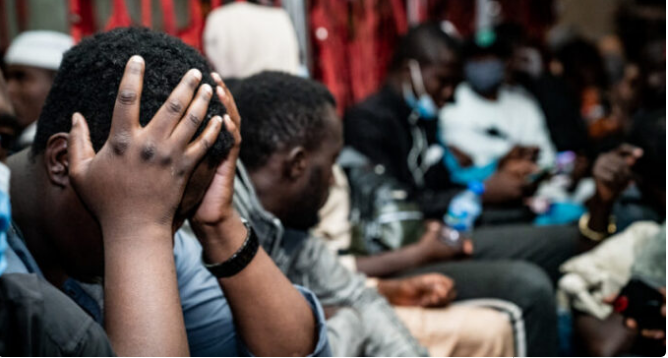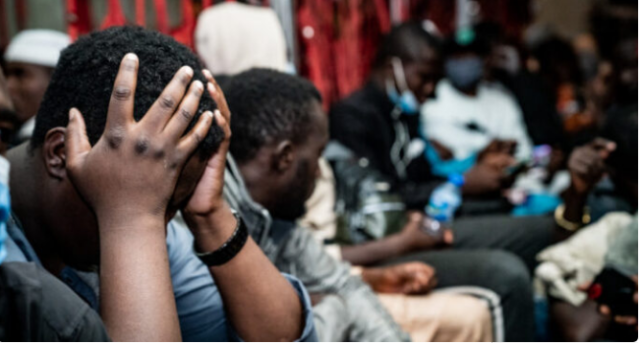
The crisis in Sudan trapped many Nigerian students in a bloodbath they knew nothing about. Yet, as they weaved through webs of uncertainty, a haunting familiarity echoed — a painful reminder of fellow citizens once stranded in war-torn Ukraine. Undeterred, they clung to hope, the desire to return home serving as a beacon. So far, they have triumphed.
On April 15, Sudan’s military and the Rapid Support Forces (RSF), a paramilitary group, amplified a power tussle they had nestled for years into a full-blown war. The fight broke out in Khartoum, the country’s capital which is home to many foreign citizens including business persons, diplomats, and students. Nigerians make up a large percentage of the last group.
As the power tussle continued, fears that Sudan could plunge deeper into chaos were raised. Foreign governments began scrambling to safely evacuate their citizens. With no definite response from the Nigerian authority, soon, Nigerian students began to fear that their cries for help had drowned in the noise of war.
FG: NON-ADHERENCE TO CEASEFIRE BLOCKING EVACUATION EFFORTS
In efforts to restore peace to an already troubled north African country, global organisations like the United Nations (UN), African Union (AU), Economic Community of West African States (ECOWAS), and countries like the US and UK, all proposed peace talks and cease-fire requests. Sadly, their cry for peace fell on deaf ears.
On April 21, Nigeria’s ministry of foreign affairs said the raging war was frustrating evacuation efforts.
The ministry said it was in contact with the Sudanese authorities and through the Nigerian embassy in Khartoum had made an official request for permission to evacuate Nigerian students and other members of the Nigerian community who wished to depart the country.
FIRST SIGNS OF HOPE
Three days after the ministry’s announcement, Abike Dabiri-Erewa, chairperson of the Nigerians in Diaspora Commission (NiDCOM), said the evacuation of the students would begin in 24 hours.
She said the federal government had asked for a safe corridor for the evacuation of the students, adding that they would be transported by buses to the borders of Egypt before being airlifted to Nigeria.
The war in Sudan had made it nearly impossible for flight routes to operate.
Dabiri-Erewa said the process had been delayed because the federal government was yet to hear from Sudan’s army and the RSF on a safe passage.
STAY PUT, HELP IS ON THE WAY, FG TELLS FRUSTRATED STUDENTS
Soon, reports began to surface that some Nigerian students were taking matters into their hands. The heat from the war had intensified and the death toll was multiplying. There was a shortage of food, water, shelter, and medicine. Help was urgently needed.
Some students successfully made it out to Ethiopia, others were making calculative plans with the student union group towards a safe escape.
In response to that, the ministries of foreign affairs and humanitarian affairs warned against the dangers of undertaking the unsafe journey without security in view.
The ministries urge parents to advise their wards that while concerted efforts are being made to evacuate them, the students should endeavour to remain calm and maintain constant communication with officials of the Nigerian Embassy in Sudan for instructions and updates.
Concrete plans are underway to deploy help swiftly, the ministries had said.
THE $1.2M BUSES ARRIVE
On April 26, buses finally arrived to evacuate the students.
Geoffery Onyeama, minister of foreign affairs, said the buses would number up to 40, adding that it cost the government $1.2m.
Onyeama’s announcement stirred heated conversations and mixed reactions. Many faulted the government for expending such a huge amount for a job that did not require so much.
The ministries of foreign affairs and humanitarian affairs both described the criticism as “uncalled for”.
They said the federal government “negotiated in a condition of war”. They also mentioned that “there are competing demands for the same bus services by other countries” trying to safely evacuate their citizens.
Security cover for the journey to the Egyptian borders was also among the expenses, the ministries added.
“More buses are arriving this morning and the stranded students will depart today,” NIDCOM said.
The vehicles would convey them to Egypt’s borders before being airlifted to Nigeria.
BUS ON THE ROCKS
On April 27, a video emerged of what appeared to be Nigerian students stranded in a desert.
The reason for the halt in the trip was an alleged incomplete payment to the bus drivers by the Nigerian government.
“Can you imagine that we have been stuck in this desert for five hours, we don’t know the situation we’re in and our money has finished,” a female student in the video said.

“And the drivers said they’re not moving their buses because they did not give them money. Look at this place, we don’t even have a compass to know our location. Everything has finished, we are in an unknown location and in very big danger.”
Dabiri-Erewa said the evacuation process was a tedious one and that challenges were expected.
She said the government was in touch with the students and that relevant agencies would resolve the situation in no time.
The NIDCOM chair added that the Nigerian students were expected the following day barring any unforeseen circumstances.
ARRIVAL OF UNFORESEEN CIRCUMSTANCES
On April 28, Dabiri-Erewa announced that evacuated citizens had been stranded at the Egyptian border.

The NIDCOM boss said over 7,000 nationals, including Nigerians, were refused entry into Egypt because authorities were insisting on visas to transit to their countries, despite that the Nigerian Air Force (NAF) had arrived to airlift citizens.
She said the Nigerian mission in Egypt had been working tirelessly to rectify the issue.
EGYPT LET THE PEOPLE GO
Three days later, the borders were open. Dabiri-Erewa said the development happened after President Muhammadu Buhari spoke with Abdel Fattah El-Sisi, the Egyptian president.
FIRST BATCH OF EVACUATED STUDENTS ARRIVE
On May 3, the first batch of evacuated Nigerian students returned to the country.
Some of those evacuated from Egypt by Air Peace arrived at the Nnamdi Azikwe International Airport, Abuja at about 11:30 pm while the NAF plane conveying another set touched down at the airport in Abuja at about 12 midnight.
The evacuees were screened by officials of the ministry of health upon arrival in the country.

Sadiya Farouk, minister of humanitarian affairs and disaster management, said each returnee would be given N100,000.
Meanwhile, Dabiri-Erewa had said that Nigerian universities made offers to admit Sudan returnees and that a continuation of their education would not be a problem.
“SUDAN MISSES YOU”
As a welcome home remark to the first batch of evacuees and a wooing call to the batches to come, Muhammad Yusuf, Sudan’s ambassador to Nigeria, asked the students not to delay in returning to the north African country after the crisis cools off.
“I’m very sorry for what is happening there but at the same time I’m very happy to have these evacuees coming from Sudan safe, no life is lost. Nigerians are coming from their second country now to their home countries,” Yusuf said on May 4.
“I hope that things will be controlled there (Sudan) and safety would be back and rehabilitation will be started there and you can come back to your second country to pursue and continue your studies for those who are students and for others who have business there.”
It is unclear if the returnees share Yusuf’s sentiments.
THE SECOND BATCH ARRIVES, AND THEN THE THIRD, THE FOURTH…
Soon, more batches began to roll in. Although not without hitches. On May 5, the second set arrived – a day after they were expected to.

Eventually, other groups followed suit, mostly via Tarco Airlines, Azman Air, NAF, and Air Peace.
FG COMPLETES EVACUATION OF ALL NIGERIAN STUDENTS
On May 13, the federal government said it had completed the evacuation of all Nigerian students from the Egypt border and Port Sudan.
The students were evacuated in 15 batches. The latest arrival has brought the total number of evacuated Nigerians to 2,246, NIDCOM said.
So far, no life was lost.

At the moment, it is unclear if the evacuation process will continue for other non-students who may be stranded in Sudan, but if you’re trying to figure out why the war is still raging, here’s a quick explainer.







